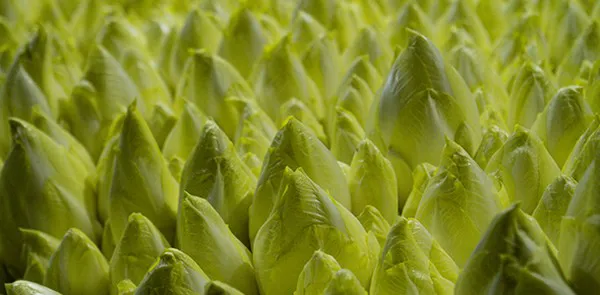As winter approaches, and especially Christmas, the demand for chicory increases in Belgium; however, it remains to be seen whether there will actually be chicory on everyone's plate again this year. The persistent rain is causing tension on the market. "The period ahead of Christmas is the most important period for many winter vegetables, and for chicory in particular, but there is no continuity. Some continue to work with old roots, while others have already switched to new ones. I think there may be problems with the supply in December," said Charles Cattoir, from Primalof.

The biggest issue appears to be heavy rainfall in large parts of Belgium. "It's very wet. Some roots have certainly been pulled out, but we should now be at 40 to 60%, and I think we are not even at 20% yet. Also, many growers are working with various different varieties, but the most acceptable early varieties are mostly still in the ground. That is leading growers to start experimenting with varieties that are actually not suitable for production in November and December, just to avoid the inactivity."
As regards the harvest, Benny Cuypers, from BelOrta, is a bit more optimistic, but he, too, says that the weather will play a key role. "According to my estimations, right now we have harvested between 25 and 35 percent; at most, 40 percent. It depends on the grower, but we will really need a dry spell. We're not panicking yet, but growers continue to resort to the short periods between rains to get the roots out of the ground. We still have some time, but in the next few weeks we will need more persistent dry conditions. If it starts freezing, the situation could become catastrophic, and then we'd have real problems."
Major imbalance
Charles believes that "the most important factor is what the weather is going to bring in the next 4 weeks. I think it's unrealistic to think that everything is going to come off the ground. Some areas, like West Flanders or parts of France, are very badly affected. We are keeping an eye daily on the weather forecast and taking advantage of the good days to get going. The wetness will only cause delays for now, but the season had already started with some issues. Because of the late seeding, a lot less has been sown, percentage-wise, so there were already fewer roots in the ground. In normal circumstances, there would have already been a slight shortage and issues to meet the market's needs, but now there will be an even greater imbalance."

Moreover, the flooded fields raise concerns about the quality. "Chicory that has been in very wet soils for weeks is susceptible to disease." Benny agrees. "It may be too early to really talk about shortages, but we are already seeing some switching from old roots to new ones and the process has not been easy. Some are going to continue working for a long time with old roots, which can make it hard to obtain the desired quality. And due to the weather conditions, the new roots are also not yielding the desired productions. The volume on the market is not big and we see that reflected in the prices at the moment."
Christmas period
Prices are going through the roof. At the Belgian auctions, they briefly came close to 3 Euro. "It is inevitable," said Charles. "The increased costs to grow chicory have to be reflected in the sales prices, which are already quite high. They remained too low for a long time, while our costs have been increasing exponentially since the crises. Now you also get substantially lower volumes, and trade might be deterred by the high prices. The consumer will also feel it in the store, but in general, I don't think it's wrong to pay more for a very labor-intensive product like chicory, as you would for a beer at the pub."

Still, Benny hasn't particularly noticed this yet in the demand. "It seems that the high prices still have to be fully reflected in the store shelves, and then we will have to wait and see how things go. We are now in the period when chicory is traditionally in high demand. The beginning of autumn and the run-up to winter is the time par excellence for chicory purchases, and there are many promotions. Prices are therefore very high and I expect this to continue for some time."
Keeping a close eye
The weather will also determine what will happen in 2024. "The rain really should stop before the New Year; otherwise, we will have a serious problem and we will have issues with the production after New Year. There's no need to panic yet, because a lot can still be fixed, but we will have to keep a close eye on the situation," said Benny.
Charles agrees with this. "Since the chicory has been in wet soil for a long time, it is susceptible to diseases. Over the long term, we will start to see shortages and longer periods of inactivity. Growers may decide to stop as early as, for example, April, and take a gamble on the new harvest, which may also lead to problems with seasonal workers. Before December, the supply is already very inconsistent, but in the months after that it will remain precarious."
For more information:
Charles Cattoir
Primalof
Leeg Bracht 23
9860 Balegem, Belgium
+32 (0)483 48 47 17
charles@primalof.be
www.primalof.be
Benny Cuypers![]()
BelOrta
Mechelsesteenweg 120
B-2860 Sint-Katelijne-Waver, Belgium
+32 (0)15 55 11 11
info@belorta.be
www.belorta.be
